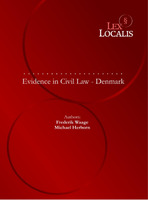Evidence in Civil Law - Denmark
Author(s)
Waage, Frederik
Herborn, Michael
Language
EnglishAbstract
Danish civil procedure is based on a number of procedural law principles that affect the taking of evidence, including the principle of party presentation, the principle of disposition, and the principle of free assessment of evidence. The nature of Danish procedural law tends towards the adversarial model rather than the inquisitorial model. Evidence is taken during the hearing and the principle of directness applies to the procedure. Danish civil procedure is governed by the 1916 Administration of Justice Act, which was originally strongly influenced by German law. The role of the judge is to lead the process and also to intervene in proceedings when uncertainty exists, rather than just to facilitate the process by ensuring the parties abide by the laws of civil procedure.
Keywords
civil procedure; due process; fair trial; free assessment; access to justice; law of evidence; procedural law; Burden of proof (law); Case law; Criminal procedure; Danelaw; Denmark; Expert witness; Letters rogatory; Oral stageDOI
10.4335/978-961-6842-46-4ISBN
9789616842464OCN
945783121Publication date and place
2015Series
Law & Society,Classification
Political structure and processes


 Download
Download